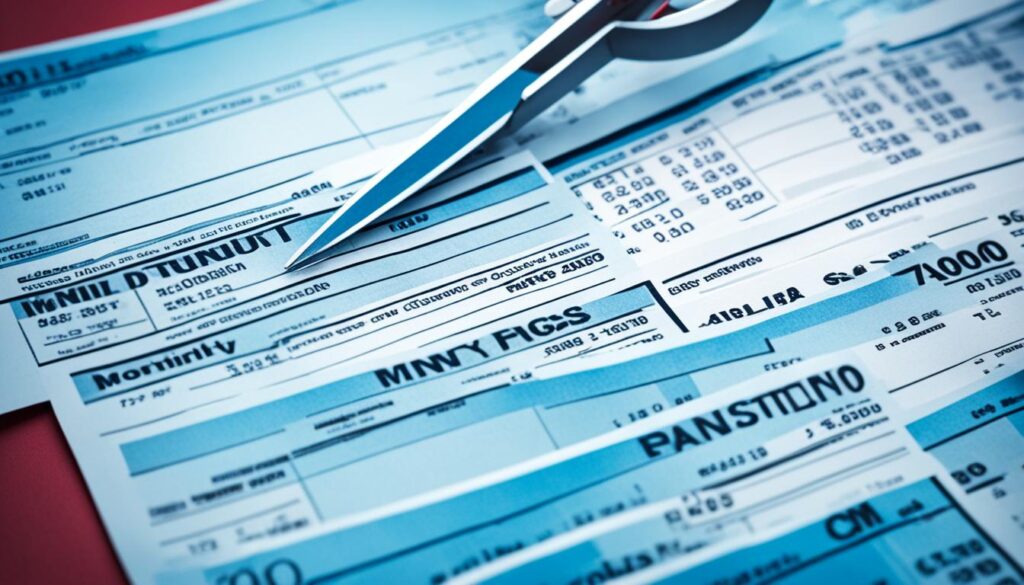Saving money is a critical aspect of financial planning and personal finance. Whether you’re looking to invest, budget, or secure your retirement, it all begins with effective money management and saving strategies. In this article, we will explore actionable tips and techniques to help you save more money and achieve your financial goals.
Automate Your Savings
One of the best ways to save money is to automate your savings. By setting up automatic transfers from your checking account to your savings account each month, you can effortlessly grow your savings over time. This simple technique ensures that you consistently set aside money without any additional effort.
Additionally, there are money management apps available that can further streamline your savings process. Apps like Digit and Qapital can automatically transfer small amounts from your checking account to a separate savings account on your behalf. These apps analyze your spending patterns and savings goals to determine the optimal amount to transfer, making it easy to reach your saving targets.
By automating your savings, you eliminate the risk of forgetting to set money aside each month, and you can take advantage of advanced algorithms and money management tools to optimize your saving strategy.
Track Your Expenses
To save more money, it’s essential to track your expenses. By creating a budget and diligently recording all your expenses, you can gain insights into your spending habits and identify areas where you can cut back. This allows you to make informed decisions and prioritize your savings goals.
Categorize Your Expenses
When tracking your expenses, it’s helpful to categorize them to get a clearer picture of where your money is going. Some common expense categories include groceries, entertainment, and subscriptions. By categorizing your expenses, you can easily identify which areas of your spending might be excessive and find opportunities to reduce costs.
For example, you might discover that you’re spending a significant amount of money on eating out or ordering takeout. By being aware of this spending habit, you can make conscious choices to cook more meals at home, which can lead to significant savings over time.
Create a Budget
Creating a budget is an essential step in tracking your expenses and managing your finances. It helps you allocate your income towards different categories and ensures that you have enough money for both your needs and wants.
Start by listing all your sources of income and subtracting your fixed expenses, such as rent or mortgage payments, utility bills, and loan payments. Then, allocate a portion of your remaining income towards savings and determine a reasonable amount for discretionary spending.
Having a budget not only helps you track your expenses but also provides a roadmap to achieving your financial goals. It allows you to make conscious choices about how you want to spend your money and helps you stay accountable to your savings targets.
Utilize Technology and Apps
In today’s digital age, there are many tools and apps available to simplify the process of tracking expenses. These budgeting apps can automatically categorize your expenses, provide visual representations of your spending habits, and even send you notifications when you’re approaching your budget limits.
Some popular budgeting apps include Mint, YNAB (You Need a Budget), and Personal Capital. These apps sync with your bank accounts and credit cards, making it easy to track your expenses in real time. They also offer features like goal tracking and personalized insights to help you make smarter financial decisions.
Tracking your expenses is a crucial step towards improving your financial well-being. By understanding your spending habits and prioritizing your savings goals, you can make conscious choices that will lead to long-term financial stability.
Minimize Everyday Costs
When it comes to saving money, minimizing everyday costs can make a significant impact on your budget. By making smart choices and implementing a few strategies, you can keep your expenses in check without sacrificing your lifestyle. Here are some practical tips to help you minimize everyday costs and save money:
Cut Back on Restaurant Spending
One of the easiest ways to save money is to reduce your restaurant spending. Instead of dining out frequently, consider cooking meals at home more often. This not only saves you money but also allows you to have more control over the ingredients and portion sizes. Additionally, explore cheaper dining options, such as food trucks or budget-friendly restaurants, to satisfy your cravings without breaking the bank.
Look for Entertainment Discounts
Entertainment expenses can add up quickly, but there are ways to enjoy your favorite activities without spending a fortune. Keep an eye out for discounts on entertainment options such as museums, movie theaters, or local events. Many museums offer free admission days or discounted tickets, and community events often provide affordable entertainment for the whole family. By taking advantage of these opportunities, you can have fun without compromising your budget.
Time Your Major Purchases
When making major purchases like appliances or furniture, strategic timing can help you save a significant amount of money. Research and compare prices, and wait for annual sale periods when retailers offer discounts and promotions. By planning ahead, you can make your purchase at the right time and take advantage of potential savings. This approach applies not only to big-ticket items but also to seasonal purchases like clothing or holiday gifts.
Implement the 30-Day Rule for Online Shopping
Online shopping can be tempting, but impulse purchases can quickly drain your wallet. Combat impulsive spending by implementing the 30-day rule: wait for 30 days before making a purchase. This rule gives you time to evaluate whether the item is a necessity or merely a want. During this waiting period, you may find that your desire for the item diminishes or that you discover a better deal elsewhere. By practicing patience, you can avoid unnecessary expenses and save money in the long run.
By minimizing everyday costs through conscious decision-making and implementing budget-friendly strategies, you can achieve significant savings over time. Remember, even small changes can make a big difference in your financial well-being.

| Tip | Description |
|---|---|
| Cut Back on Restaurant Spending | Cook meals at home more often and explore cheaper dining options. |
| Look for Entertainment Discounts | Take advantage of discounts on museums, movie theaters, or community events. |
| Time Your Major Purchases | Research and plan for annual sale periods to get the best deals on big-ticket items. |
| Implement the 30-Day Rule for Online Shopping | Wait for 30 days before making an online purchase to avoid impulsive buying. |
Reduce Monthly Expenses
To save more money, it’s important to find ways to reduce your monthly expenses. By making small changes in key areas of your budget, you can free up extra cash and boost your savings. Here are some practical tips to help you lower your monthly expenses:
1. Lower Your Car Costs
Car ownership can be a significant expense, but there are ways to minimize the costs. Consider refinancing your auto loan to get a better interest rate and lower monthly payments. Shop around for cheaper car insurance rates by comparing quotes from different providers. These simple steps can help you save money on your car expenses.
2. Reduce Your Gas Usage
Another expense associated with owning a car is gas usage. To lower your fuel expenses, practice fuel-saving techniques like driving less, carpooling, and avoiding rapid acceleration. By being mindful of your driving habits, you can save money at the pump and reduce your environmental impact.
3. Bundle Your Cable and Internet Services
If you have separate cable and internet bills, consider bundling these services with a single provider. Many companies offer discounted rates when you bundle, which can result in significant savings over time. Take advantage of these bundle deals and enjoy the convenience of consolidated billing.
4. Switch to a More Affordable Cell Phone Plan
Cell phone plans can be a costly monthly expense. Review your current plan and compare it to other providers to find a more affordable option. Look for plans that offer the right amount of data, talk, and text for your needs, and consider switching to a prepaid plan if it aligns with your usage patterns.
5. Explore Ways to Lower Your Electric Bill
Your electric bill can fluctuate throughout the year, depending on your energy consumption. To lower your electric bill, practice energy-saving habits such as turning off lights when they’re not in use, unplugging electronics, and using energy-efficient appliances. Additionally, consider installing a programmable thermostat to regulate your home’s temperature and reduce energy waste.
6. Lower Your Student Loan Payments
If you’re burdened with high student loan payments, explore options for reducing your monthly obligations. Enroll in income-driven repayment plans that calculate your monthly payment based on your income and family size. You may also be eligible for loan forgiveness programs or loan consolidation, which can make your payments more manageable.
By implementing these strategies to reduce your monthly expenses, you can free up more money to save or invest in other areas of your life.

Implementing simple changes can lead to significant savings over time. By reducing your car costs, gas usage, cable and internet bills, cell phone plan expenses, electric bill, and student loan payments, you can gain greater control over your finances and work towards your financial goals.
Creative Saving Techniques
Get creative with your saving techniques to save even more money. By thinking outside the box and exploring alternative options, you can find unique ways to cut costs and increase your savings. Here are some creative ideas to help you save:
Affordable and Thoughtful Gifts
Instead of spending a fortune on expensive items, consider giving creative and affordable gifts. Homemade herb gardens or personalized books can make thoughtful and budget-friendly presents. These gifts not only save money but also show a personal touch that will be appreciated by the recipient.
Utilize Car Sharing Services
Owning a car can be expensive when you factor in car payments, insurance, maintenance, and fuel costs. Explore car sharing services like Zipcar or Turo as an alternative. These services allow you to rent a car only when you need it, saving you money on all the expenses associated with car ownership. Plus, you’ll be contributing to a greener environment by reducing your carbon footprint.
Stock Up on Household Supplies
Keep an eye out for sales or discounts on household supplies and essentials. When you find a great deal, stock up on items you frequently use, such as cleaning products, toiletries, or non-perishable goods. By doing so, you’ll avoid paying higher prices later and ensure you always have what you need on hand.
Take Advantage of Community Events
Participating in free community events and local initiatives is a fantastic way to enjoy entertainment without breaking the bank. Many communities offer free concerts, art exhibitions, or outdoor activities throughout the year. Check your local community calendar or city website to discover upcoming events that you can attend with friends or family.

Being creative with your saving techniques not only helps you save money but also brings a sense of excitement and ingenuity to your financial journey. Experiment with different strategies and find what works best for you, allowing you to enjoy life while still building your savings.
Optimize Your Bills
To save money on your monthly expenses, it’s essential to optimize your bills. By taking strategic steps to eliminate debt, set savings goals, and make informed financial decisions, you can maximize your savings potential and achieve long-term financial stability.
Eliminate Debt
Debt can be a major drain on your finances, as the interest payments can consume a significant portion of your budget. Make it a priority to eliminate your debt as quickly as possible. Consider creating a debt elimination plan by prioritizing high-interest debts and implementing a debt repayment strategy. By reducing your debt burden, you’ll free up more funds for savings.
Set Clear Savings Goals
Having clear savings goals is crucial for effective financial planning. Take the time to identify your short-term and long-term savings objectives. Whether you’re saving for a down payment, retirement, or a dream vacation, creating a timeline and tracking your progress will keep you motivated and focused on achieving your goals.
Utilize Interest-Bearing Accounts
To maximize your savings, consider opening an interest-bearing account such as a savings account or certificate of deposit (CD). These accounts offer higher interest rates compared to regular checking accounts, allowing your money to grow over time. Research different financial institutions to find the best interest rates and terms that align with your savings goals.
Monitor Interest Rates and Consider Refinancing
Keep a close eye on interest rates, especially if you have a mortgage or other loans. When interest rates drop, refinancing your mortgage or other loans can potentially lower your monthly payments and save you money in the long run. Explore refinancing options with different lenders to find the best terms and interest rates that suit your financial situation.

Optimizing your bills is a key strategy for saving money and achieving financial success. By eliminating debt, setting clear savings goals, utilizing interest-bearing accounts, and monitoring interest rates, you can make significant progress towards your financial objectives.
Lifestyle Changes for Savings
Make simple lifestyle changes to increase your savings. By implementing these changes, you can save money while maintaining a comfortable lifestyle.
Quit Smoking
Quitting smoking can have both health and financial benefits. Not only will you improve your well-being, but you can also save thousands of dollars each year. The cost of cigarettes and related expenses adds up quickly, making it a worthwhile financial decision to quit smoking.
Staycation
Instead of splurging on expensive vacations, consider going on a staycation. A staycation allows you to explore local attractions or simply enjoy quality time at home. By avoiding travel and accommodation expenses, you can significantly reduce your vacation costs, making it easier to save money for other financial goals.
Weatherize Your Home
Reduce utility costs by weatherizing your home. Simple steps such as sealing windows and doors, installing insulation, and using energy-efficient appliances can make a big difference in your energy bills. Lowering your water heater temperature and considering the installation of an on-demand or tankless water heater can provide additional utility savings.
| Weatherization Techniques | Utility Savings (Average) |
|---|---|
| Sealing windows and doors | $200 per year |
| Installing insulation | $400 per year |
| Using energy-efficient appliances | $100 per year |
| Lowering water heater temperature | $50 per year |
Implementing these weatherization techniques can result in significant savings on your yearly utility bills. Not only will you reduce your environmental impact, but you’ll also have more money in your pocket.
Smart Money Habits
Develop smart money habits to save money consistently. By making small changes in your daily habits, you can build a strong foundation for long-term financial success. Here are some smart money habits that can help you save more:
Pack Your Lunch
Instead of buying meals at work or eating out every day, pack your lunch to cut down on daily expenses. Not only will this save you money, but it also allows you to have more control over the ingredients and nutritional value of your meals.
Utilize Interest-Bearing Accounts
Make your money work for you by utilizing interest-bearing accounts. Consider opening a savings account or a certificate of deposit (CD) that offers a competitive interest rate. This way, your savings can grow over time, giving you an additional source of income.
Annualize Your Spending
Analyze your recurring costs to understand the long-term impact on your budget. This could include expenses like vending machine snacks, monthly subscriptions, or unused memberships. By annualizing your spending, you can identify areas where you can make adjustments and potentially save a significant amount of money in the long run.
By incorporating these smart money habits into your daily routine, you’ll be able to save more money and make progress towards your financial goals. Remember, small changes can lead to big savings over time.
Regular Evaluation and Review
To stay on top of your financial goals and make progress towards them, it’s crucial to regularly evaluate and review your budget and savings progress. Allotting time each month to assess your expenses, adjust your budget, and track your savings goals can pave the way for financial success in the long run.
During your budget review, take a close look at your income and expenses. Are there any areas where you can make further adjustments? Analyzing your spending habits can help identify areas for improvement and potential savings opportunities.
Tracking your savings progress is equally important. Are you meeting your savings targets? If not, reassess your goals and make necessary adjustments. It’s essential to stay on track and make saving money a consistent habit to achieve your financial aspirations.
Regular evaluation and review of your budget and savings progress will empower you to make informed decisions, maximize your savings potential, and pave the way for a secure financial future.

